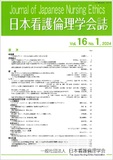Japanese
English
- 販売していません
- Abstract 文献概要
- 参考文献 Reference
本研究は、看護師の倫理的実践の向上を目指し、より効果的な組織的支援を検討するために、看護ケアの倫理コンピテンシーの構成要素と構成要素間の関係性を明らかにすることを目的とする。関東甲信越地方にある地域医療支援病院3病院に勤務している看護師189名を対象に、アンケート調査を行った。看護ケアの倫理コンピテンシーの構成要素は7つで構成されていた。構成要素間の関係性は、【倫理的課題の特定】から【倫理的課題の共有】を経由し〈看護実践〉へ、もしくは【倫理的課題の特定】から〈看護実践〉への2つのルートを経て、【倫理的実践からの教訓】と関連を示した。潜在変数〈看護実践〉は4つの行動に関するコンピテンシーと関連した。今後、看護ケアの倫理コンピテンシーの構成要素間の関係性を踏まえ、7つのコンピテンシーの獲得に焦点を当てた研修と周囲のサポートが必要だと考える。
The purpose of this study was to clarify the components of ethical competence in nursing care and the relationship between the components, improve nurses' ethical behavior, and examine more effective organizational support. A questionnaire survey was conducted on 189 nurses working at three regional medical support hospitals in the Kanto-Koshinetsu region. Ethical competence in nursing was a sevencomponent construct. The relationship between the components was divided into two routes, from [Identification of ethical issues] to [Sharing of ethical issues] to〈Nursing practice〉, and from [Identification of ethical issues] to〈Nursing practice〉. Then the relationship with [Lessons of ethical practice] was demonstrated. The latent variable〈Nursing practice〉was associated with four behavioral competencies. Based on the relationship between the components of ethical competencies in nursing care, we believe that nurses require training that focuses on acquiring the seven competencies and support from those around them.
Copyright © 2024, The Japan Nursing Ethics Associatin. All rights reserved.


